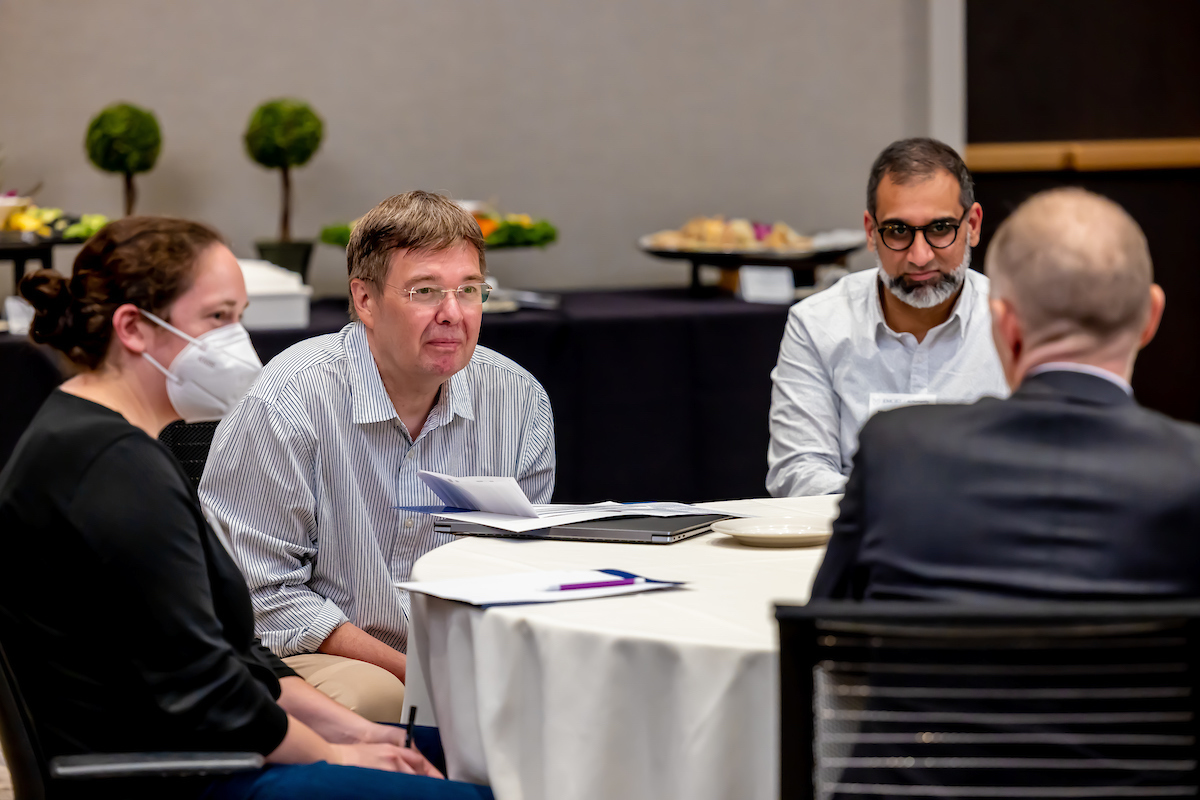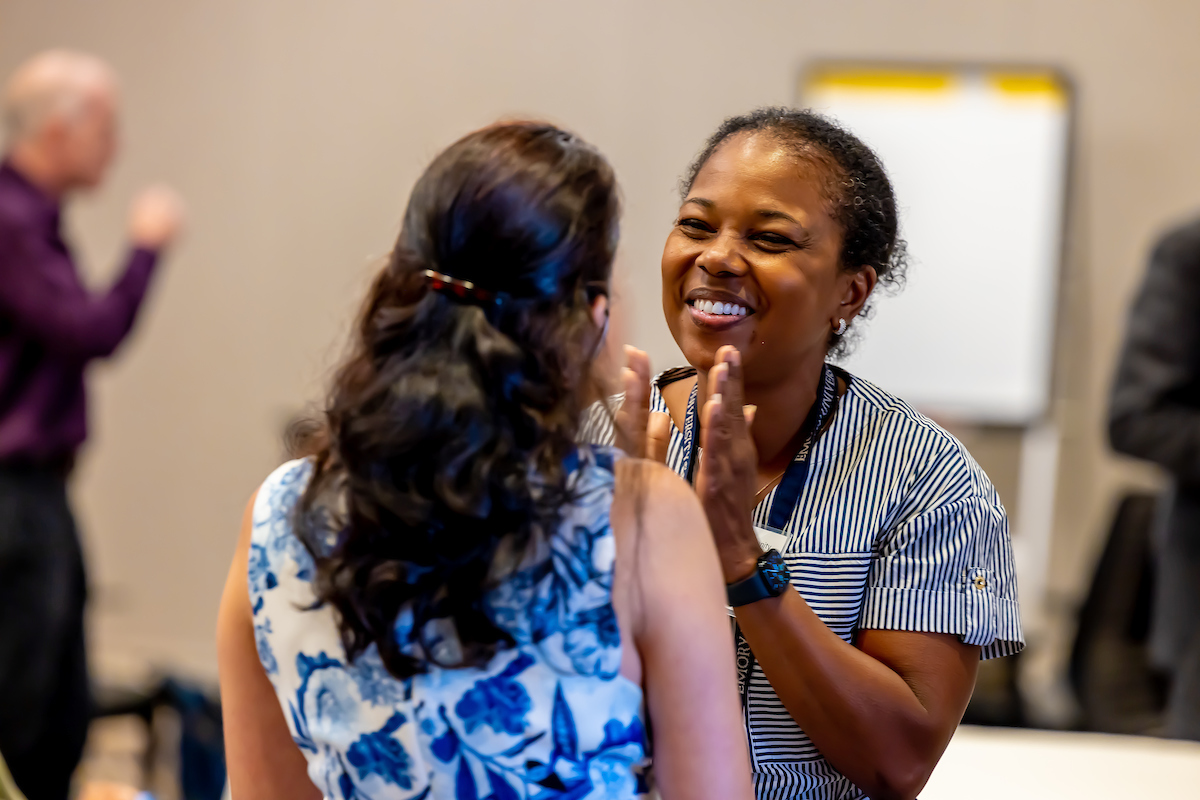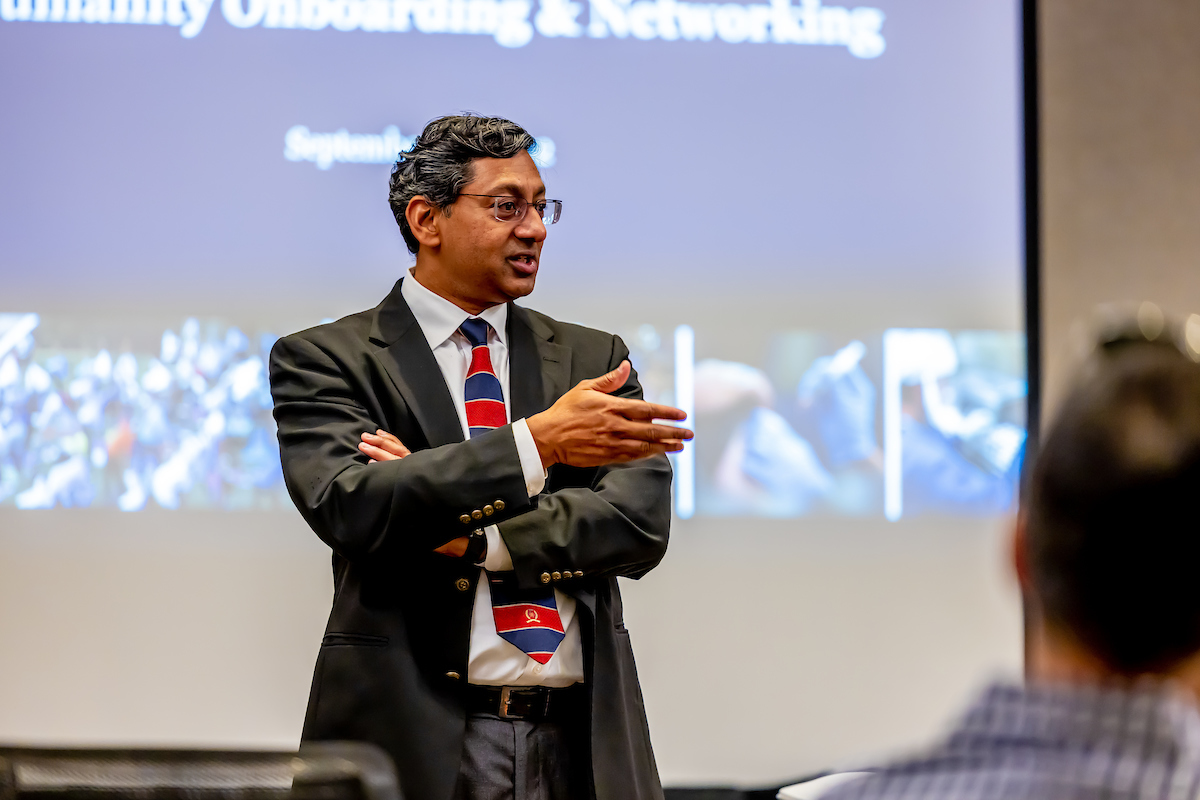How can AI (artificial intelligence) contribute to personalized cancer care? Can AI help detect customers’ emotion from their social media comments or fundamentally change supply-chain management for businesses? Is there a role for computerized decision making in determining jail sentences? Can AI make politicians more accountable to their constituents and push the bounds of human creativity?
All these crucial questions are within the reach of Emory faculty associated with the AI. Humanity initiative, whose focus is to “harness the power of artificial intelligence to advance human progress in areas such as health, social justice, business and law, and the arts and sciences,” says Ravi V. Bellamkonda, provost and executive vice president for academic affairs.
This fall has seen an influx of 19 new AI.Humanity faculty — with even more to come. And it is not just the numbers that will tick up; it is Emory’s influence and impact on the national conversation about AI.
At an onboarding and networking event for AI.Humanity faculty across the university earlier this fall, Bellamkonda said: “This is one of the most exciting things happening on campus. It is made doubly exciting by all the new faculty joining us.” Altogether, Emory will hire between 60 and 75 new faculty through the AI.Humanity initiative; they will join a strong cadre of existing researchers working in computing, data and the quantitative sciences.
New and established faculty spent time getting to know one another, often making plans for further collaboration, at the September networking and onboarding event for AI.Humanity faculty. 
A galvanizing force across the university, as top minds come together in a groundbreaking arena, AI.Humanity is playing a decisive role in the drive to achieve faculty eminence. The initiative was singled out when Emory recently won the 2022 Higher Education Excellence in Diversity (HEED) Award, a national honor recognizing colleges and universities that demonstrate an outstanding commitment to diversity and inclusion.
Ten of the new AI.Humanity faculty are women, for instance, which compares favorably to 2020-21 statistics from the National Center for Education Statistics. The data show that of 248,247 degrees and certificates awarded in computer and information sciences, 21.9% of bachelor’s degrees went to women, 33.8% of master’s degrees, and 25.7% of doctoral degrees.
Samaneh Nasiri 20PhD is rejoining Emory from Harvard Medical School after receiving her degree in biomedical informatics here. Her research brings together AI, mathematics, computation and medical knowledge to develop solutions to sleep problems as well as predict neurological and cardiovascular diseases.
She believes that “Emory’s AI.Humanity program is providing a fertile environment for faculty to address some of the most urgent, difficult and ever-emerging challenges of our times.” Having experienced it firsthand as a student here, she values Emory’s diversity, which she views as “its greatest strength because diversity enhances creativity.”
Certainly, one significant “challenge of our times,” which Emory is addressing head-on, is the ethics of AI. With the expectation of being a leader in the national conversation, the university has much to draw upon, including contributions from Emory’s Center for Ethics and faculty hires such as Ifeoma Ajunwa, AI.Humanity Professor of Law and Ethics at the School of Law. Her scholarship and teaching focus on the intersection of law and technology with an emphasis on the ethical governance of workplace technologies.
In the near future, Emory expects to announce the James W. Wagner Chair in Ethics, an endowed chair faculty position with a special focus on the ethics of AI, created to honor Emory President James W. Wagner (2003-2016). John Lysaker, William R. Kenan Professor of Philosophy, is chairing the search committee and notes: “AI and machine learning operate throughout social life. We — and I mean all of us — need to proceed deliberately and insist that the values served by those operations are explicit, inclusive and admirable. Whoever comes to hold the Wagner Chair will be a scholar capable of facilitating those conversations and keeping them not only honest but imaginative, hopefully transformative. I am thrilled that Emory has elected to make ethical consideration central to this initiative.”
Building the infrastructure
Emory has committed to making AI.Humanity faculty-driven, a point Bellamkonda underscored at the networking event, saying, “I want to hear from you. What is the best way to organize and define Emory’s interpretation of AI? What kind of faculty shall we recruit going forward? What infrastructure will serve your needs best?”
According to Lance Waller, “The faculty-driven component of the initiative is key for its longevity.” Waller heads the Community Subgroup of the AI.Humanity Advisory Group. A professor in the Department of Biostatistics and Bioinformatics at Rollins School of Public Health, he also directs the Woodruff Health Sciences Center Strategic Initiative in Data Science.
Developing a sense of community among faculty is another key to the initiative’s success, says Waller. “When this initiative first began coming together, the thing that had me most excited was how integrative this could be across disciplines. A lot of universities invest in pieces and hope those sum to a greater total. Emory has made a broader investment to achieve higher ends.”
As a longtime faculty member, he has always known Emory’s secret sauce — namely, that it is “a big university that thinks it’s small,” a quality that gives Emory the nimbleness to pursue bold ideas. The campus is compact, and people don’t hesitate to reach out to colleagues in other departments and programs.
And with that running start, Waller and his fellow advisers have advanced additional ideas for enhancing belonging and collaboration. “When you are hiring a lot of people, you need to make sure that the people who are here feel valued. We need to be intentional about community. It is not enough to get great people in place; we need to give them the ability to go even beyond what they have achieved to date,” Waller says.
The Community Subgroup is fostering interdisciplinary collaboration where scholars from different fields meet to discuss current research and share information regarding the practice of AI and data science. For instance, the Rigor and Reproducibility webinar series began in 2020. In addition to providing a platform for presenting faculty research, the seminars often touch on recurring themes of broad interest, such as working ethically and lawfully with data in a research environment. “Not everyone needs to show up to every webinar,” Waller indicates, “but we have created spaces where people can look for information.”
The “Constructive Collisions” series convenes potential partnerships between Emory and Georgia Institute of Technology faculty, and it identifies pilot funds and incubators that enable early collaborations to grow into ongoing research projects and workgroups. The most recent entry in the series was a networking and pitch competition between researchers at Emory and Georgia Tech on the topic “AI.Humanity with a Social Justice Lens.”
Matthew Sag already knows the power of community on campus. Joining Emory School of Law in April 2022 as Professor of Law in Artificial Intelligence, Machine Learning and Data Science, Sag made the move because, he says, “Emory's AI.Humanity initiative places it at the cutting-edge of the most significant technological and social transformations since the Internet itself.”
A leading authority on the fair-use doctrine in copyright law and its implications for researchers in text data mining, machine learning and AI, Sag says: “The legal issues I pursue are closely entwined with conceptual and philosophical issues about the nature of cognition, intention and the attribution of authorship and responsibility. My conversations with Emory faculty taking a digital humanities approach to English literature are particularly rewarding.”
Beyond the networking event, AI.Humanity faculty are collaborating through seminars, workshops, interest-group meetings, funding opportunities and more.
Revising the curriculum
With the faculty influx, the curriculum will be revised — in part, says Vaidy Sunderam, to “respond to student demand.” Sunderam chairs the advisory group’s Education Subgroup and says that the goal is to offer new courses and focused study paths, enhance existing courses and embed AI where appropriate.
Before coming to Emory as an associate professor of computer science and co-director of the Natural Language Processing Group, Fei Liu was associate professor of computer science at the University of Central Florida.
“I am thoroughly impressed by Emory students,” says Liu, who will teach a class on natural language processing this spring. “Emory has some of the best AI researchers in the world, and I think students will enjoy the unique experience of working with a larger cohort of AI faculty.”
Kristin Williams also recently joined computer science, which became its own department in 2018, splitting off from mathematics. An assistant professor, Williams’ research is on turning everyday objects into IoT (Internet-of-Things) devices — an approach she calls an Upcycled IoT. She developed this approach as a way to design IoT to be responsive to how “families use [their] household objects to manage daily life in idiosyncratic ways that differ from family to family.”
This semester Williams is teaching “Social and Ethical Issues in Computing,” a course she created. “I want to get my students to think about the implications of what they are building, not building a new technology because they can,” she says.
Like Williams, Waller too believes that Emory has much to contribute in sorting out “can” from “should.” “Going from ‘can’ to ‘should’ means that you need a number of people asking different questions of one another. We will make sure that we have connections in place for something peculiarly Emory to arise,” he says.
Williams is impressed that Emory is engaging faculty across the enterprise, calling it a “forward-thinking strategy that really resonated with me as a human-computer interaction researcher whose background is in the liberal arts. Faculty here are energized and grappling with meaty questions about what kinds of technologies we want to build and whether they ultimately will provide benefit,” she notes.
An exhortation to “be bold”
During the networking event, Bellamkonda opened up the floor to a series of provocative questions. In what ways should Emory engage industry partners like Microsoft or Google? How can we bring in more PhD students and research staff collaborators to work with AI faculty? How can the university better leverage Atlanta’s strengths, such as its diversity and preponderance of health data?
In his remarks at the networking event, Provost Bellamkonda said, “I have every expectation that this will be a thriving, vibrant community, and this is a great beginning.”
The discussion flowed freely. Energy was high. As Bellamkonda encouraged, “Be bold. You are not bound to our previous world.”
New Al.Humanity Faculty
Ifeoma Ajunwa, AI.Humanity Professor of Law and Ethics, School of Law
Research focus: the intersection of law and technology with an emphasis on the ethical governance of workplace technologies.
Yana Bromberg, acting professor, Biology and Computer Science, Emory College of Arts and Sciences
Research focus: bioinformatics and machine-learning approaches to protein function prediction and genome variation analysis.Julianne Chung, acting associate professor, Mathematics, Emory College of Arts and Sciences
Research focus: numerical methods and software for computing solutions to large-scale inverse problems, such as those that arise in medical imaging applications.
Matthias Chung, acting associate professor, Mathematics, Emory College of Arts and Sciences
Research focus: numerical analysis and scientific computing, inverse problems, computational biology, applied linear algebra, machine learning, parameter estimation, dynamical systems and optimization.
Jian Hu, assistant professor, Human Genetics, Emory University School of Medicine
Research focus: a methodological component focusing on developing novel statistical methods for biomedical data and an applied component focusing on applying these methods for clinical and biological studies.
Nasim Katebi, assistant professor, Biomedical Informatics, Emory University School of Medicine
Research focus: unsupervised learning, probabilistic graphical models, Bayesian deep learning, signal processing, time-frequency analysis and dynamical system.
Chinmay Kulkarni, acting associate professor, Computer Science, Emory College of Arts and Sciences
Research focus: human-computer interaction, learning at scale and social computing, AI-enabled future of work.
Fei Liu, acting associate professor, Computer Science, Emory College of Arts and Sciences
Research focus: natural language processing and deep learning, with special emphasis on automatic summarization.Anant Madabhushi, professor, Biomedical Engineering, Emory University and Georgia Tech
Research focus: applying AI, radiomics, computational pathology, medical image analysis and computer vision for diagnosis, prognosis and prediction of treatment response for different types of cancers, cardiovascular disease, kidney disease and ophthalmology.
Samaneh Nasiri, assistant professor, Biomedical Informatics, Emory University School of Medicine
Research focus: AI, mathematics, computation and medical knowledge to develop solutions to sleep problems as well as predict neurological and cardiovascular diseases.
Elizabeth Newman, assistant professor, Mathematics, Emory College of Arts and Sciences
Research focus: Multidimensional algebra, numerical linear algebra, machine learning, deep neural networks and optimization.Matthew Sag, Professor of Law in Artificial Intelligence, Machine Learning and Data Science, School of Law
Research focus: the fair-use doctrine in copyright law and its implications for researchers in the fields of text data mining, machine learning and AI.
Hui Shao, associate professor, Hubert Department of Global Health, Rollins School of Public Health
Research focus: predictive modeling, using advanced machine learning, microsimulation and econometrics method to build valid predictive models to resolve real-world issues.
Scott Tyson, acting associate professor, Quantitative Theory and Methods, Emory College of Arts and Sciences
Research focus: Formal political theory, political economy, conflict, authoritarian politics, experimental design and theoretical implications of empirical models.
Marly Van Assen, assistant professor, Radiology and Imaging Sciences, Emory University School of Medicine
Research focus: new technologies in cardiothoracic imaging, CT perfusion, CT-FFR and AI, machine learning in CT.Kristin Williams, assistant professor, Computer Science, Emory College of Arts and Sciences
Research focus: Upcycled IoT (Internet-of-Things), turning everyday objects into IoT devices; human-computer interaction; physical computing; participatory design for marginalized populations.
Ran Xiao, assistant professor, School of Nursing
Research focus: applying engineering principles, machine learning and data science to health care research.
Emma Jingfei Zhang, associate professor, Information Systems and Operations Management, Goizueta Business School
Research focus: point processes and their applications, statistical analysis of networks, graphs and tensor data, with applications in business, neuroscience and social science.
Andreas Züfle, acting associate professor, Computer Science, Emory College of Arts and Sciences
Research focus: mining spatiotemporal data with applications in transportation, epidemiology, social science and urban computing.
